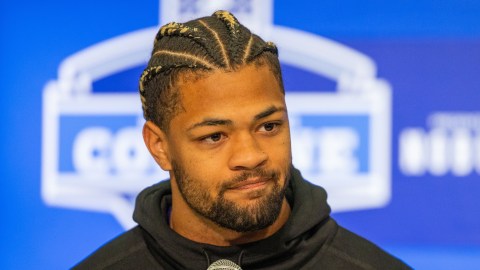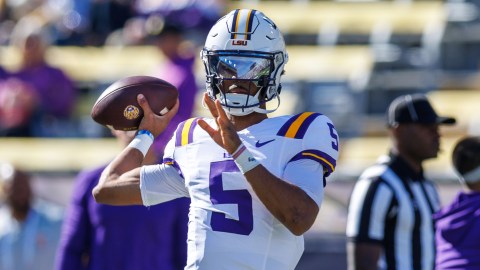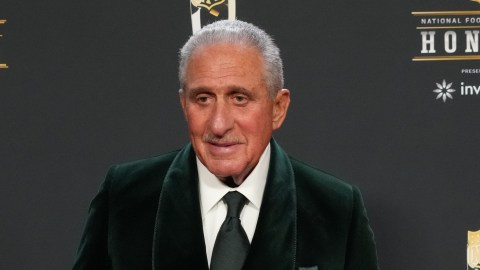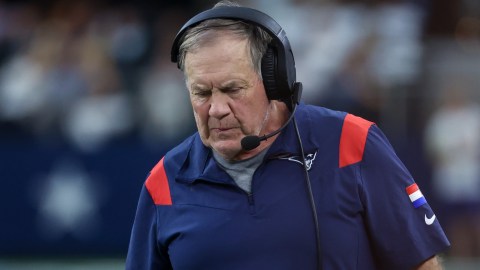 BOSTON — Former San Diego Chargers defensive back Paul Oliver died Sept. 25 of a self-inflicted gunshot wound. That evening, Hall of Famer Harry Carson spoke at a WGBH event previewing PBS’ new Frontline film, League of Denial: The NFL’s Concussion Crisis, which documents the NFL’s neglect on concussion issues over the last two decades.
BOSTON — Former San Diego Chargers defensive back Paul Oliver died Sept. 25 of a self-inflicted gunshot wound. That evening, Hall of Famer Harry Carson spoke at a WGBH event previewing PBS’ new Frontline film, League of Denial: The NFL’s Concussion Crisis, which documents the NFL’s neglect on concussion issues over the last two decades.
Carson, a former New York Giants linebacker, linked Oliver’s death to football’s head injury crisis that night. He didn’t need research. He didn’t want caveats. He realizes concussions are more complicated than what can be seen through a 59-year-old’s eyes, but his linebacker’s instincts have told him all he needs to know.
Carson appears in the new Frontline film, but he started talking about concussion issues in 1992, long before they became a hot topic — or even a topic most people would consider.
“I said then, ‘There will come a point in time when players start committing suicide,’” he said at the WGBH event.
The reason he knows, he said, is because he once felt the same way.
Carson was drafted by the Giants in 1976 and played 13 years for New York, winning respect across the league and a spot in the Hall of Fame. But during the 1980-1981 season, the sport had started to change for him.
Carson, a captain, was often asked to speak to the media after games. Usually an affable fellow who could provide some comments, Carson began to realize he was having trouble getting his thoughts together. His words weren’t coming out smoothly, and he found himself saying “um” a lot.
“I recognized there was something going on,” he said.
Carson was also fighting a deep darkness. He had it all then — the car, the family — but he found himself struggling with depression, and he contemplated driving himself and that car off the Tappan Zee Bridge. He decided to live for his child, even as the life he was living resembled less of the life he had always known.
Carson did some broadcasting after he was done playing, but he struggled to pull his words together then, too. He would lose his train of thought in the middle of talking. He had trouble with bright lights sometimes. Finally, when he went in for a regular physical, he asked the doctor to check it out. He thought maybe he had a brain tumor, because he had heard of someone with similar symptoms being diagnosed with that.
“There were things going on with me that I could hardly explain,” he said.
He was diagnosed with mild post-concussion syndrome, his last game two years behind him.
Carson said his fellow NFL players knew they were at risk in their violent sport — that they could wreck their knees, have lifelong pain. But this was different.
“When we played, we didn’t realize we were doing this to our bodies,” he said. “… Those hits [even in high school and college] do not necessarily go away.”
Even players who thought they may get brain damage didn’t realize it would be so bad, or that it would happen when they were so young. Players have been dying in their 40s and 50s with severe symptoms in recent years, their brains resembling those of much older people who died with advanced Alzheimer’s disease.
Carson figured there were other NFL players who had it worse, so he started talking about it. In the Frontline film, he appears during the opening segment, which focuses on Mike Webster, the first player found to have chronic traumatic encephalopathy, or CTE, in his brain. That discovery led to the concussion research that has linked football and long-term brain damage, and it also started the NFL’s vociferous denial of the connection.
“It’s something that’s always been around, but people don’t talk about,” Carson said of concussions at the WGBH event. “… [With Webster], little did I realize I was contributing to his demise.”
While many NFL players will talk about knowing the risk and may say they still would have taken the field had they known what they were getting into, Carson does not play the hero. He says he wouldn’t have played, even though he’s learned to manage his symptoms and may be one of the luckier ones. He even sold an ownership stake he had in an Arena Football League team after he watched a practice and left feeling uneasy about the hits the players were taking and the responsibility that left him with.
Carson also gets the often-asked question of whether he’d let a child of his play. He’s on to the grandfather stage now, the 4-year-old just a wallet photo away. It’s an easy answer.
“Do you value your children?” he asked. “If you don’t value your child, then go ahead and let him play.”
He said the same message three different ways, adding that swimming and golf are just fine, but there will be no contact sports for the most precious person in his life.
“It’s important to understand what the truth is,” he said. “… You can never say in the future, ‘I didn’t know.’”
Photo via Twitter/@JTD_23



